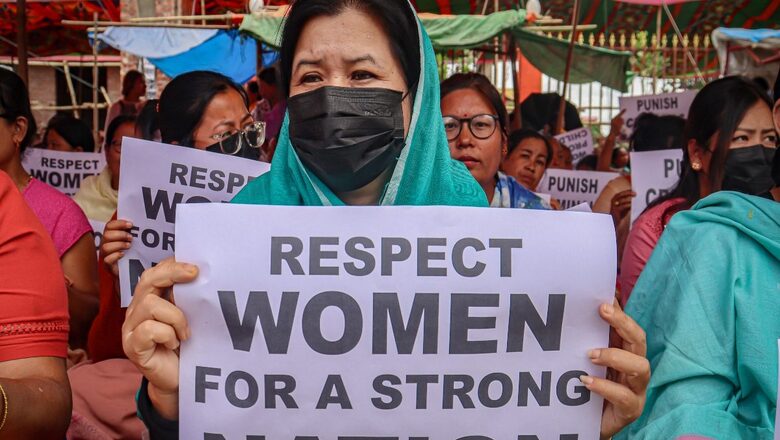
views
Protecting women against violence is not an expense but an investment. This is one of the mottos and themes of the International Day for the Elimination of Violence Against Women, that marked the launch of the UNITE campaign from November 25 till December 10. An initiative of 16 days of activism concluded on the day that commemorates International Human Rights Day.
As we approach the end of 2023, the most alarming statistics are shared by the National Crime Records Bureau (NCRB) Report 2022. The report shows a harrowing increase in crimes against women. Every 51 minutes, a crime against women is committed. The cruelty by husband and relatives is 31.4 per cent, rape is 7.1 per cent, and assault on a woman with intent to outrage her modesty is 18.7 per cent. The NCRB data says that the total registered cases of crime against women are 4,45,256. This is the national data on crime against women. The causes mentioned are just a few which are considered top causes of crime against women.
Till date, crime against women remains the most prevalent and horrific violation of human rights across the globe. Globally, an estimated 736 million women, which is almost one in three, have been subjected to physical and/or sexual intimate partner violence, non-partner sexual violence, or both, at least once in their lives. The word intimacy and domestic implies faith and these rising crimes against women are a grim indicator of the fact that women across the globe have been let down to get that faith and honest relationship and suffered violence in the most intimate and close relationships.
It’s important to understand that some violence against women (VAW) remains unreported, undeclared or not even considered violence. This is due to the silence stigma and traditions across religions and cultures that have victimised women for the entire morality of humanity. The entire corpus of chastity morality and being pure is a said and unsaid codification prescribed on a woman’s body. The chastity and morality of any civilisation rests on the bodies of its women only.
A woman is raped for honour, paraded for honour, killed for honour. As human rights attendance gets no takers when it comes to women’s rights, it’s important to address women’s issues as human rights issues and strongly condemn any violence against women as human rights violence. There should be no consideration of tradition, culture or religion to take it as a catalyst to allow gender-based violence. Female genital mutilation, child marriage, dowry, sex slavery, extremism and terrorism are being used to assault and subjugate women. These are just a few manifestations of our society’s codification of women and their bodies. And while girls are being used as sex slaves, being subjected to all kinds of violence, mind you, it’s not the Middle Ages or Dark Ages but this all is happening while we ‘so-called humans’ plan to move to Mars and Moon.
In today’s modern age, gender-based violence manifests itself in physical, sexual and psychological forms, encompassing intimate partner violence (battering, psychological abuse, marital rape, femicide); sexual violence and harassment (rape, forced sexual acts, unwanted sexual advances, child sexual abuse, forced marriage, street harassment, stalking, cyber- harassment); human trafficking (slavery, sexual exploitation); female genital mutilation and child marriage. The list would not fit here if every category of gender-based violence was listed.
The impact of this violence against women and girls is irreparable. This violence has an adverse impact on the psychological, sexual and reproductive health of a woman. Educational disadvantages not only represent the primary obstacle to universal schooling and the right to education for girls down the line, but they are also to blame for restricting access to higher education and even translating into limited opportunities for women in the labour market. So in short, it’s an irreparable block to women’s development and again would reiterate basic human rights violations.
While gender-based violence can happen to anyone, anywhere, some women and girls are particularly vulnerable, for instance, young girls and older women, women who identify as lesbian, bisexual, transgender or intersex, migrants and refugees, indigenous women and ethnic minorities, or women and girls living with HIV and disabilities, and those living through humanitarian crises. The globe is rich with references in all categories when it sees through a gender-based violence lens.
Why should this be a serious matter of concern across countries and states, society, families, institutes, and crowds? Violence against women continues to be an obstacle to achieving equality, development, and peace as well as to the fulfilment of women’s and girls’ human rights. All in all, the promise of the Sustainable Development Goals (SDGs) which aim to leave no one behind cannot be fulfilled without putting an end to violence against women and girls.
The availability of data on gender violence internationally has improved substantially and there is currently information from at least 161 countries. The United Nations Population Fund (UNFPA) and UN Women are working to draw conclusions from these figures. The identification of the issue is the first step towards its solution. The Indian government’s efforts in tackling women’s issues have been appreciated worldwide. The Sexual Harassment of Women at Workplace (Prevention, Prohibition, and Redressal) Act, 2013 (POSH) is appreciated on a global forum. However, the thousands of years of subjugation need some active and constant hammering to be on some major side of achievement. There is a need for the institutionalisation of some laws and articles that support women’s presence in various forums and fields. The Women’s Reservation Bill took ten years to be tabled and now has seen the light of implementation. With major gender-based steps taken to see more women in the public space and workspace, it becomes even more important to have a safe environment for women.
If this author is literate, she has to thank the women of India who struggled for women to get the light of education.
Babasaheb Ambedkar says that to check the social health of any society, it’s important to see how the women of that society are treated. In the land of Aryabhatta, where he names his treatise after his lost daughter Lilawati, and in the land where we never had to fight for our voting rights, the women of this country are set to be more active and more visible in every scenario. It is for society, the workplace, the travel place, and the entire public and private space to take in this changing and active role of our women.
The rising data of crimes against women signify the tough stand of women who are ready to take all risks and fight to own their space, but at the same time, it also is a signatory to the law and order and safety implementation agencies to have an extra edge and work culture to make space safe for women.
Society will only survive if she survives as ‘HE’ is incomplete without ‘SHE’.
Dr Syed Mubin Zehra is a Historian, Academician and a strong voice on gender and human rights. Views expressed in the above piece are personal and solely that of the author. They do not necessarily reflect News18’s views.



















Comments
0 comment